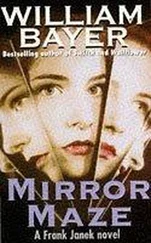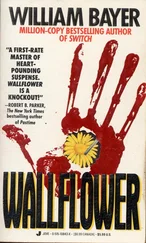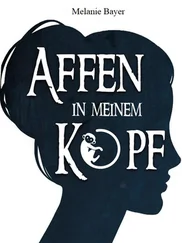William Bayer - Tangier
Здесь есть возможность читать онлайн «William Bayer - Tangier» весь текст электронной книги совершенно бесплатно (целиком полную версию без сокращений). В некоторых случаях можно слушать аудио, скачать через торрент в формате fb2 и присутствует краткое содержание. Жанр: Криминальный детектив, на английском языке. Описание произведения, (предисловие) а так же отзывы посетителей доступны на портале библиотеки ЛибКат.
- Название:Tangier
- Автор:
- Жанр:
- Год:неизвестен
- ISBN:нет данных
- Рейтинг книги:5 / 5. Голосов: 1
-
Избранное:Добавить в избранное
- Отзывы:
-
Ваша оценка:
- 100
- 1
- 2
- 3
- 4
- 5
Tangier: краткое содержание, описание и аннотация
Предлагаем к чтению аннотацию, описание, краткое содержание или предисловие (зависит от того, что написал сам автор книги «Tangier»). Если вы не нашли необходимую информацию о книге — напишите в комментариях, мы постараемся отыскать её.
Tangier — читать онлайн бесплатно полную книгу (весь текст) целиком
Ниже представлен текст книги, разбитый по страницам. Система сохранения места последней прочитанной страницы, позволяет с удобством читать онлайн бесплатно книгу «Tangier», без необходимости каждый раз заново искать на чём Вы остановились. Поставьте закладку, и сможете в любой момент перейти на страницу, на которой закончили чтение.
Интервал:
Закладка:
He was delighted to find the shop still open and only Colonel Brown's dusty Plymouth parked outside. He walked in, nodded to Peter, then inspected a rack of spy novels while observing the transaction taking place in front.
"Bunch of damn baboons," the Colonel was saying, "that's what these Moroccans are. Still swinging from the trees as far as I'm concerned."
He purchased an oversized bottle of soy sauce and a pair of gardening gloves. "It's not just Barclay," he muttered as he paid. "It's all of us now-the whole British community under attack."
He rushed off then, the door slamming behind him. Lake emerged from behind the book rack and approached Peter with a smile.
"I know," he said, "Katie Manchester called Janet the minute she got home from church. Guess you've got some ideas about that, Peter. Who do you think it is?"
Zvegintzov squinted through his spectacles. "If I've learned one thing," he said, "it's not to speculate about the British."
"Very good," Lake laughed. "Well put, Peter. So-have you had a good business day?"
"So so," said Zvegintzov. "I sold a chess set and an Arabic-Spanish dictionary, along with the usual decks of cards. Lots of blueberry jam too. There's been a run on that. I have to order another case." He wrote something on a pad he kept on the counter, a reminder to himself about the jam, Lake guessed, though he wasn't sure, because Peter wrote it in Cyrillic script.
"You know, Peter," he said. "You've got a terrific little business here. Wonderful location. You catch them both ways I bet."
"Catch them? Oh-I see. You mean the Mountain people. Yes, I do."
"Sure. Mountain crowd's your clientele. You got a real sweet setup here."
Peter sat down on a hassock, his thick glasses perched upon his nose. One of the reasons Lake liked to come in at the end of the day was that he could count on finding Peter weary and, he thought, less on guard.
"Yes," said Peter, "but they come from all over the city too. I'm still the only one in Tangier who imports real Stilton cheese."
Lake nodded. "Quite the capitalist."
They both laughed then, a little awkwardly, Lake thought. "You know, Peter," he said, "maybe you ought to give a harder sell."
"Hmmm. What do you mean?"
"Well, for instance-" Lake moved to the center. "You could move the freezer over here against the wall. That way when someone comes in with a bunch of kids they go straight for the ice cream before the parents have time to object."
"Yes. I see. But I keep the records over there."
"Well-move them. Make a little display. Keep the hot stuff in front, the rock and roll, and the ones that don't sell too fast, the classical ones-stack them behind on the shelves. "
"Hmmm-"
"You've got to start thinking in terms of packaging. Catch the eye. Grab the public. Give people the feeling they're in an attractive environment, and put them in the mood to buy."
"Yes-"
"That's the problem with Russia, you see. Those drab state-owned stores. Rude clerks. People waiting in line. Everything out of stock. Three thousand size-twelve shoes, but they only fit your left foot. If you started thinking in business terms, you could make some real dough." Lake bit into his lower lip. "Yeah-a gold mine. You could have a real gold mine here."
"I don't do so badly now," said Peter. "My clients seem pleased enough."
"Of course. Of course they are. I didn't mean that. You're doing a hell of a job. But what happens when they put in this new road? Then the Mountain people won't be coming by here every day. Course you could move the shop, but you'd probably lose momentum if you did. I personally think you should stay here, brighten the place up, regulate the inventory, and make it worth a special trip." He paused. "Listen, I got to get going. Janet'll kill me if I'm late. Reason I came by was to invite you to dinner. We're having some Moroccans, official types, over Wednesday night. Wondered if you'd be free."
"Yes, yes. Thank you. Thank you very much."
"Good. Wednesday then. Eight-fifteen. So long, Peter. And think about what I said."
It had been a curious exchange, Lake realized, as he paused outside the shop, watching Peter struggle with his iron security grill. There was an awkward moment then as Peter locked the door, and they grinned at each other through the glass. Lake waved, Peter waved back, then turned off the fluorescent lights.
Lake waited until he'd disappeared into his little bedroom in the back. Was Peter intrigued, he wondered, about why the ranking American official in Tangier was taking such an interest in his shop? Impossible to know. His face was opaque. He revealed nothing, nothing at all.
Hamid Ouazzani was thinking of the summer as he stood on his balcony late that Sunday afternoon. The sun was above the Mountain, just about to set, and to the east he could see Djebel Ben Moussa shrouded in a darkening mist. Soon, he knew, mobs of tourists would descend upon Tangier, and with them all sorts of petty crimes. He could look forward to three months of hard work, new assistants in his office, foreigners haranguing him in European tongues, kif arrests, pickpocketings, fights in bars, rapes, cat burglaries, and trouble on the beach. He could count too, he knew, on one murder at least.
Kalinka was sitting on the banquette in their salon bent over her sketchbook, intent, working with her crayons. Hamid was pleased as he watched her draw. He'd been encouraging her the entire day. "Draw your memories," he'd said. "Draw your mother, your childhood home." And she'd surprised him-she'd agreed.
Perhaps, he thought, it was language that was the barrier, that made it impossible for her to answer his verbal probes. He didn't know, but now, watching her, he congratulated himself for suggesting that she draw. She was so talented, her sketches were always so fine, so beautifully crafted, executed with such delicate, patient strokes, and now it seemed that through them she might be able to tell him things which she could not or would not reveal to him in words.
He left the balcony, walked over to her side, peered down at her work.
She looked up at him and smiled. "Just as you said, Hamid. Pictures of the past."
She flipped through the pages, showed him what she'd done. He was fascinated, sat down beside her, looked carefully at every sketch.
The figures in them were clear and quickly drawn, all enveloped in a moody haze. There was a sketch of a petite Oriental woman ("My mother," she said) standing beside a bicycle with a conical straw hat in one hand, her other arm raised to wave. There was a picture of a heavy-set man holding a little girl by the hand and walking with her beside a lake. There were several views of streets jammed with people, all wearing conical hats, running, escaping from a storm of slashing rain. There were pictures of stoop-shouldered men dressed in black, carrying guns, slinking among trees, and a sketch of a column of upright soldiers marching behind an officer wearing a kepi.
"With my mother in a cyclo," she said, pointing to her sketch of a little girl beside a woman with the same conical hat upon her lap, the two of them sitting in a contraption attached to the front of a bicycle pedaled by a bare-legged man. Finally she had drawn a low-angle view through a doorway. In a room beyond, Hamid could see a person's back.
"That's Peter," Kalinka said. "Peter in his store serving his customers. I am behind, in the back room, looking out from the dark."
"Go on!" he said, excited now, feeling that at last a curtain was being raised. "Tell me stories about them. Talk, Kalinka! Talk!"
"They are only the past, Hamid. You asked me to draw them, and now I have."
At that she began to sign the sketches, compressing the letters of her name so they formed a seal. He looked at her-she'd surprised him again. It was the smoke, he was certain, the smoke of her hashish which she'd sucked into her lungs for so many years and which now was working its way out through her fingers, her crayons. But still she was vague. He looked at the pictures again. A beginning, he thought, a breakthrough, an access to the mysteries locked inside her brain.
Читать дальшеИнтервал:
Закладка:
Похожие книги на «Tangier»
Представляем Вашему вниманию похожие книги на «Tangier» списком для выбора. Мы отобрали схожую по названию и смыслу литературу в надежде предоставить читателям больше вариантов отыскать новые, интересные, ещё непрочитанные произведения.
Обсуждение, отзывы о книге «Tangier» и просто собственные мнения читателей. Оставьте ваши комментарии, напишите, что Вы думаете о произведении, его смысле или главных героях. Укажите что конкретно понравилось, а что нет, и почему Вы так считаете.












